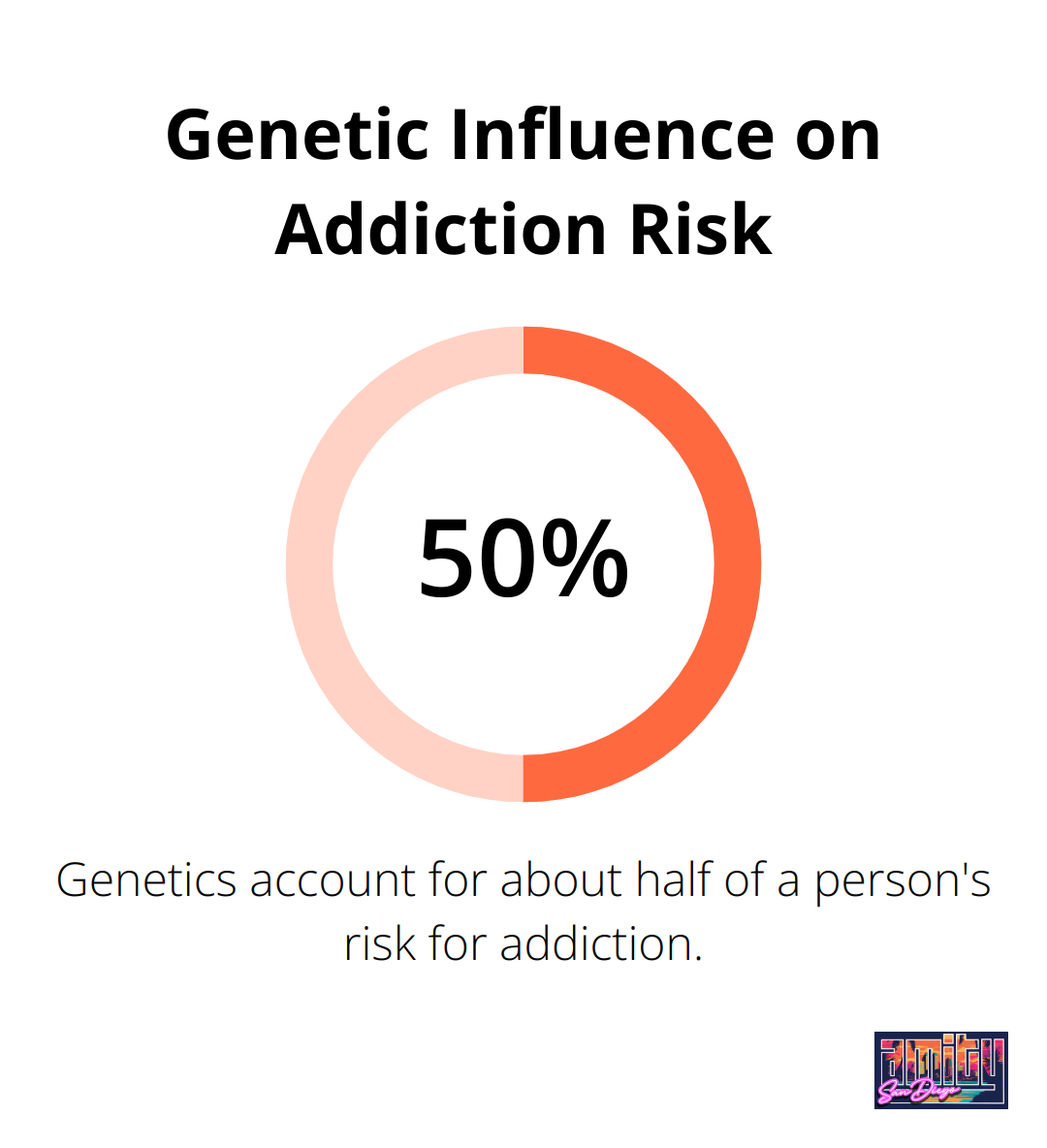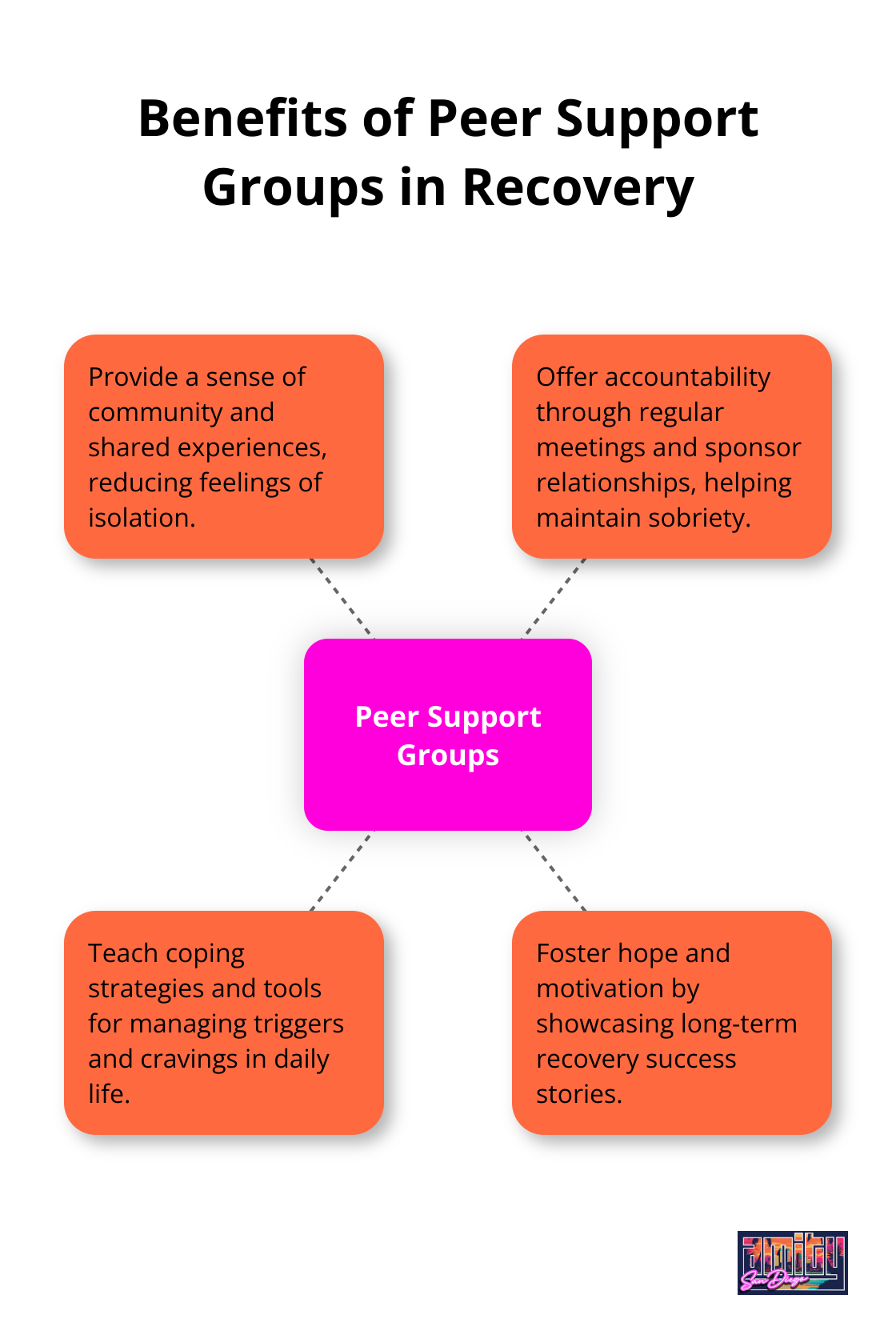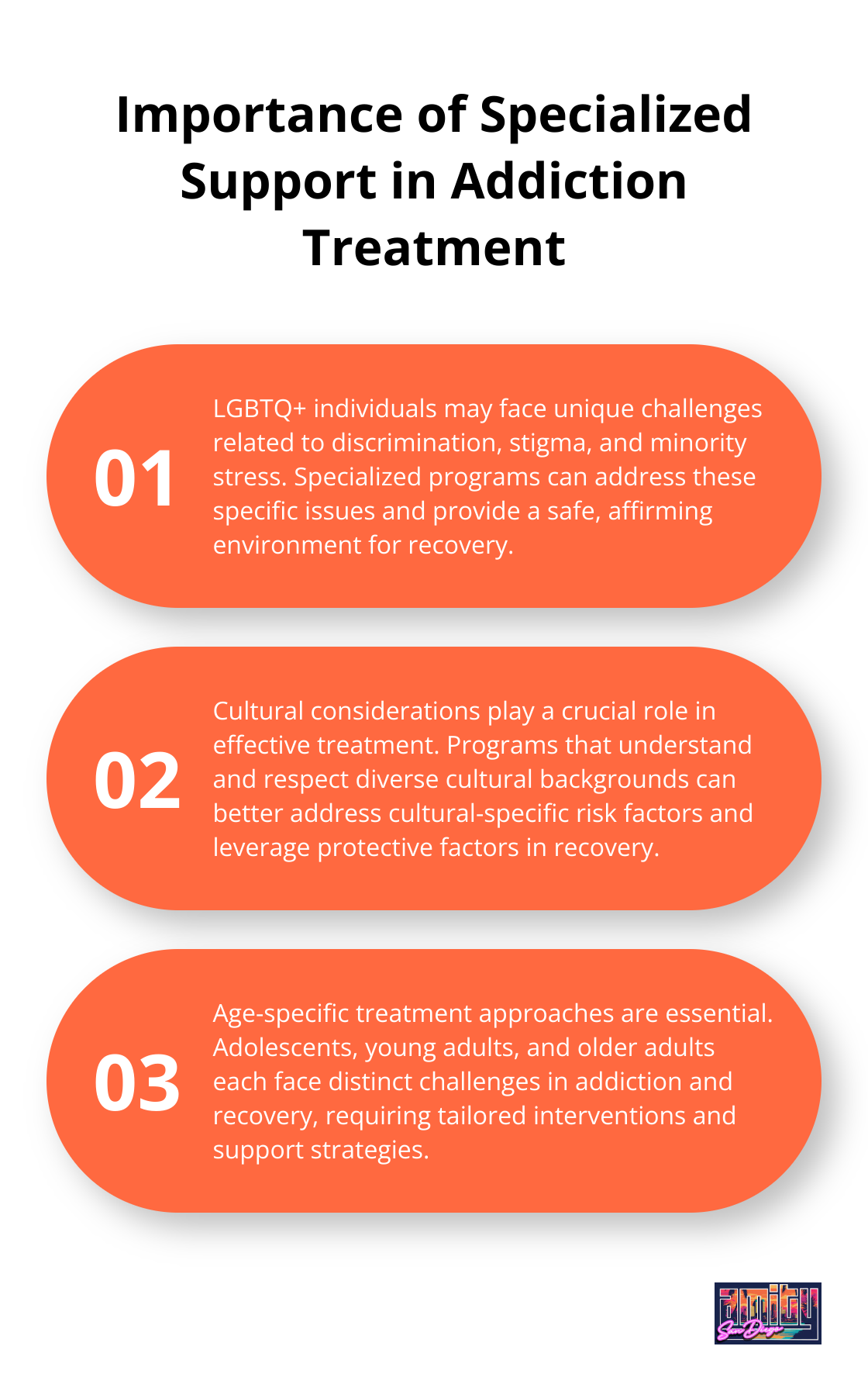At Amity San Diego, we understand that addiction recovery is a challenging journey. Finding the right addiction support can make all the difference in achieving lasting sobriety.
In this post, we’ll explore the essential components of effective support systems and guide you through the process of finding the resources that best fit your unique needs.
Why Addiction Support Matters
The Complex Nature of Addiction
Addiction isn’t a simple matter of willpower. It’s a chronic brain disease that alters neural pathways, affecting behavior and decision-making. The National Institute on Drug Abuse reports that genetics account for about 40-60% of a person’s risk for addiction. This means that while personal choice plays a role, biological factors significantly influence susceptibility.

Support: The Foundation of Recovery
Research consistently demonstrates that strong support systems improve recovery outcomes. Those with stronger social support networks remain in treatment longer and have better recovery outcomes.
Types of Addiction Support
- Professional Treatment: This includes therapy, counseling, and medical interventions. Evidence-based treatments like Cognitive Behavioral Therapy (CBT) and Medication-Assisted Treatment (MAT) form the backbone of many recovery programs.
- Peer Support Groups: Organizations like Alcoholics Anonymous (AA) and Narcotics Anonymous (NA) provide community and accountability. These groups have over 2 million members worldwide.
- Family and Friends: Loved ones play a vital role. The Substance Abuse and Mental Health Services Administration (SAMHSA) reports that family involvement can increase treatment engagement by up to 40%.
- Holistic Approaches: Activities like yoga, meditation, and nutrition counseling complement traditional treatments.
The Impact of Early Intervention
Early intervention significantly increases the chances of successful recovery. Early interventions for adolescent substance use hold benefits for reducing substance use and associated behavioral outcomes.
The Role of Personalized Care
Every person’s journey through addiction and recovery is unique. Personalized care plans (tailored to individual needs, preferences, and circumstances) often lead to better outcomes. This might include a combination of different support types, adjusted over time as needs change.
As we explore the key components of effective addiction support systems in the next section, you’ll gain a deeper understanding of how these various elements work together to create a comprehensive recovery framework.
Addiction treatment San Diego offers specialized programs for various groups, including adult men, adult women, court referrals, and military personnel.
Building Your Recovery Toolkit: Essential Components of Effective Support
At Amity San Diego, we’ve witnessed how a comprehensive support system can transform someone’s recovery journey. Let’s explore the key elements that form an effective addiction support network.
Professional Treatment: The Cornerstone
Professional treatment forms the foundation of recovery. Evidence-based therapies like Cognitive Behavioral Therapy (CBT) have demonstrated efficacy as both a monotherapy and as part of combination treatment strategies for substance use disorders. These therapies help individuals identify triggers, develop coping strategies, and build resilience.
Medication-Assisted Treatment (MAT) plays a vital role for many. This systematic review synthesizes evidence on the effects of medication-assisted treatment for opioid use disorder on functional outcomes. It’s not a temporary fix – it’s a scientifically-proven tool that, when combined with counseling, significantly improves recovery outcomes.
Peer Support: Power in Community
Peer support groups like Alcoholics Anonymous (AA) and Narcotics Anonymous (NA) offer a sense of community and accountability that’s hard to replicate elsewhere. Studies show that individuals who regularly attend 12-step meetings are more likely to maintain long-term sobriety.

Traditional 12-step programs aren’t the only option. SMART Recovery, for instance, provides a science-based approach to addiction recovery that appeals to those who prefer a non-spiritual framework. The key lies in finding a group that aligns with your personal beliefs and recovery goals.
Family and Friends: Your Personal Support Network
The support of loved ones can make a significant difference in recovery. Research demonstrates that family therapy reduces drug and alcohol use, improves family relationships, and increases engagement in treatment.
It’s essential to establish healthy boundaries. Family members often benefit from their own support groups (such as Al-Anon or Nar-Anon), which provide education and coping strategies for those affected by a loved one’s addiction.
Holistic Approaches: Nurturing the Whole Person
Holistic therapies complement traditional treatment by addressing the entire person. Yoga and meditation might be an effective preventive program for nicotine-use disorders among Indian adolescents. Studies indicate that mindfulness-based interventions significantly lower the risk of relapse.
Nutrition plays a vital role as well. Many individuals in recovery are malnourished due to prolonged substance abuse. A balanced diet helps repair physical damage, stabilize mood, and reduce cravings. Some treatment centers offer nutritional counseling as part of their comprehensive care approach.
The most effective support systems are those tailored to individual needs and preferences. Try different elements until you find the combination that works best for you. Your recovery journey is unique, and your support system should reflect that individuality.
As we move forward, we’ll explore how to find the right support for your specific needs and circumstances. This next section will guide you through the process of assessing your requirements and navigating the available resources to create a personalized recovery plan.
How to Find the Right Addiction Support
Assess Your Individual Needs
Take an honest inventory of your situation. Identify the substances you struggle with and any co-occurring mental health conditions. Recognize specific triggers or life circumstances that contribute to your addiction. This self-assessment will help you pinpoint the most appropriate support options.
For example, if you face both addiction and depression, you should look for a dual diagnosis program. Learn about substance use and mental health, including risk factors, diagnosis and treatment, how to find help, and resources for more information.
Research Local Resources
Investigate addiction treatment options in your area. Look for facilities that offer evidence-based treatments and maintain a good reputation. Check for accreditation by organizations like the Joint Commission or CARF International.
When you consider addiction treatment San Diego options, contact treatment centers directly. Ask about their specific programs, success rates, and aftercare support. Many facilities offer free assessments to determine if their programs fit your needs.
Use Digital Tools and Online Communities
Numerous online resources exist in today’s digital age. Apps like Sober Grid and I Am Sober help you track your progress and connect with others in recovery. Online support groups and forums provide 24/7 access to community support.
Exercise caution with online resources. While they can serve as helpful supplements, they should not replace professional treatment. A study published in the Journal of Medical Internet Research found that digital interventions work best when combined with face-to-face support.
Factor in Cultural and Demographic Considerations
Your background and personal identity play a significant role in your recovery journey. Search for support systems that understand and respect your cultural background, gender identity, age group, or any other important factors.
For instance, LGBTQ+ individuals may benefit from programs that specifically address the unique challenges faced by this community. The National Institute on Drug Abuse reports that sexual minorities face an increased risk for various behavioral health issues and may require specialized support.

Evaluate Treatment Approaches
Different treatment centers use various approaches (e.g., 12-step, cognitive-behavioral therapy, holistic methods). Research these approaches to find one that aligns with your beliefs and goals. Some people prefer a spiritual component, while others gravitate towards more scientific methods.
Try different options until you find the support system that resonates with you and supports your recovery goals effectively. Personalizing addiction treatment offers a wide range of benefits, including higher success rates, improved emotional well-being, and greater engagement in the recovery process.
Final Thoughts
Addiction support plays a vital role in successful recovery. We at Amity San Diego have witnessed how personalized care transforms lives. Our team offers evidence-based treatment in a compassionate environment, providing a range of outpatient services tailored to individual needs.
You don’t have to face addiction alone. Professional treatment, peer support groups, family involvement, and holistic approaches (among others) can guide you on your path to healing. The first step towards seeking help is often challenging, but it’s also the most important.
We encourage you to take action and reach out for addiction support in San Diego. Every person’s journey is unique, and finding the right combination of support will prove key to long-term recovery. You have the power to change your story, and we stand ready to support you every step of the way.

